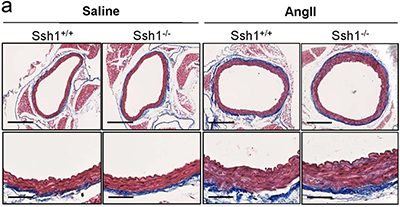The Emory University San Martin Lab is a Division of Cardiology lab within the Emory Department of Medicine.
One of the main focuses of our research is to understand the mechanisms underlying smooth muscle cell (VSMC) phenotypic modulation leading to vascular pathology. Particularly, we are interested in VSMC regulation of redox sensitive and insensitive pathways that control cytoskeleton dynamics and cells’ adhesive forces. Additionally, we have a growing interest in how cell energetics and metabolism influence the behavior of a variety of cell types.
Research Overview

- Our laboratory has identified several molecular pathways targeted by ROS in the regulation of VSMC cytoskeletal reorganization and migration. We have previously shown that in order to migrate in response to PDGF, VSMCs require the activation of the specific phosphatase, Slingshot 1L (SSH1L), which dephosphorylates cofilin and therefore controls the first step in migration, lamellipodia formation. Using a unique Nox1 transgenic animal model, we identified SSH1L activation as a redox-regulated process that involves the oxidation of its inhibitory binding partner 14-3-3. Interestingly, we have discovered that the adequate control of cytoskeleton and actin dynamics influences the inflammatory status and vasculature fibrosis in response to Angiotensin II-induced hypertension.
- Because cells in the cardiovascular system are permanently subjected to mechanical forces created by the beating heart, an additional interest of our lab is to study how the cells sense mechanical stimulation and the role of these biomechanical forces on vascular inflammation and remodeling. We have focused on Nox4 as one of the key protein that sense biomechanical force by linking the cell cytoskeleton to the extracellular matrix. Indeed, Nox4 has been shown to be important for actin cytoskeleton and focal adhesion (FA) maintenance, another interest of our lab has been to identify the signaling pathways that Nox4 uses to regulate the cytoskeleton. Our laboratory has demonstrated that treatment with factor TGF-β increases Hic5 and Hsp27 and induces their co-localization to stress fibers and the cytosol via Nox4. More importantly, we found that this Hic5/Hsp27 interaction is required for trafficking of Hic5 to FAs. Taken together, our work identifies Hic5 as a novel effector of Nox4 and supports the idea that Nox4 mediates TGF-β-induced FA maturation by upregulation and interaction of Hic5 and Hsp27 that specifically targets Hic5 to FA.
- Metabolism and Cell energetics impact cell phenotype and behavior. Recently, we established that the addition of the prosthetic group lipoic acid to catabolic enzymes is a dynamically regulated posttranslational modification that increases metabolic plasticity under hypoxia and in cancer cells. We showed that the polymerase-δ interacting protein 2 (Poldip2) is an oxygen-sensitive protein that regulates the lipoylation and activation of the pyruvate and α-ketoglutarate dehydrogenase complexes. Additionally, our work revealed that mitochondrial peptidases participate in an integrated response needed for metabolic adaptation. Our studies have positioned Poldip2 as a key regulator of mitochondrial function and cell metabolism.
Team Members
Lab Staff
- Alejandra Valdivia, PhD, Postdoctoral fellow
Alejandra is a Biologist from Universidad Catolica de Chile and PhD in Biomedical Sciences from the Universidad de Chile. Her main research interest is to study how Rho family of GTPases could affect cytoskeleton dynamics of vascular smooth muscle cells during normal and pathological conditions. - Kely Sheldon, Postdoctoral fellow
- Gloria Torres, DVM PhD, Postdoctoral fellow
Gloria is a DVM and PhD in Biochemistry from the Universidad de Chile. To obtain her DVM degree, she investigated the effect of some traditional drugs like aspirin could improve the immune response in Chagas disease. Then, to obtain her PhD degree, she studied the changes in mitochondrial dynamics and function caused by an analog of glucagon in vascular smooth muscle cell. Now, in San Martin's lab the team is studying how a protein that regulates cytoskeleton dynamics could affect mitochondrial dynamics-function and change cell metabolism of vascular smooth muscle cell. - Holly Williams, postdoctoral fellow
Lab Alumni
- Kelly Clause, PhD
- Charity Duran, PhD
- Isabel Fernandez, BS
- Hope Gole, PhD
- Mithu Maheswaranathan, BS
- Marcelo Montenegro, PhD
- Kiran Verma, MS
- Zhen Yang, PhD
Collaborators
- Griendling Lab
- Sergio Lavandero
- Mario Chiong
- Roy Sutliff, PhD
Contact Us
If you have any questions, please contact us at 404-727-1738.
Emory University School of Medicine
Department of Medicine, Cardiology Division
307 Woodruff Memorial Building
1639 Pierce Drive
Atlanta, GA 30322

